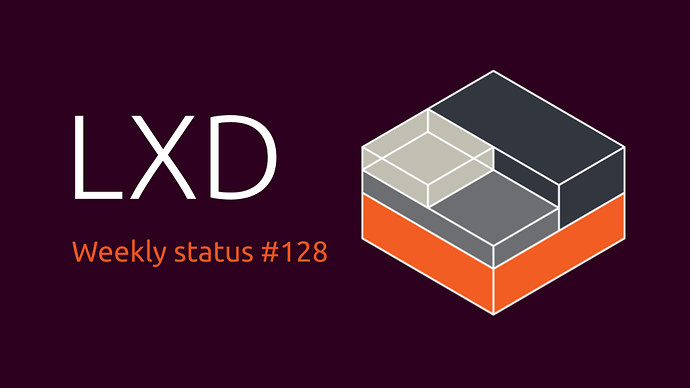Weekly status for the week of the 9th December to the 15th of December.
Introduction
This past week’s LXD focus was still on the initial VM feature and its associated storage layer re-work.
It was also a deadline for a number of contributions coming from students at the University of Texas in Austin. Many of those contributions are still under work/review but some got merged this week. This includes laying the ground work required for LXD to use nftables firewall, support for abstracting cgroup v1/v2 and a new way to track external processes (such as dnsmasq and forkprox).
On the VM front two security improvements have been added; firstly the VM processes on the host are now chrooted to their own directory, and secondly they are run as a non-root user. We have also ensured that the 9p share inside the VM that is used by the lxd-agent is mounted in such a way that prevents non-root users in the VM from accessing the share files (as it contains a private TLS key identifying the VM that will be used when communicating with the host).
On the storage front, the directory and cephfs drivers are now finished, the btrfs driver is undergoing review and we are continuing to work on porting the other storage drivers to the new framework.
On the LXC front, works has continued on refactoring the cgroup management functionality as we work towards cgroup2 support.
Contribute to LXD
Ever wanted to contribute to LXD but not sure where to start?
We’ve recently gone through some effort to properly tag issues suitable for new contributors on Github: GitHub · Where software is built
You can also find a slightly longer, more detailed list here: Contributing to LXD - #4 by stgraber
FOSDEM 2020 - containers devroom
We will once again be running the containers devroom at the upcoming FOSDEM conference in Brussels, Belgium. This year it’s going to be over the weekend of the 1st and 2nd of February.
The detailed call for papers can be found here: FOSDEM 2020 containers devroom: Call for papers - #2
Upcoming events
Ongoing projects
The list below is feature or refactoring work which will span several weeks/months and can’t be tied directly to a single Github issue or pull request.
- Virtual machine support
- Rework of internal LXD storage handling
- Distrobuilder virtual machine support
- Various kernel work
- Stable release work for LXC, LXCFS and LXD
Upstream changes
The items listed below are highlights of the work which happened upstream over the past week and which will be included in the next release.
LXD
- lxd/firewall: Create Firewall interface and implement XTables
- Implementing Background Process Manager
- tests: Always pass --force
- index.md build from source improvements
- Implement SuitableArchitectures
- lxd/daemon: Port daemon storage to new functions
- cgroups: pre-mount on pure-cgroup2 systems with cgroup namespaces
- tests: Don’t leak storage in ENOSPC test
- lxd/db: Rename ContainerNames to InstanceNames
- lxd/storage: Port remaining functions
- lxd/iptables: Fix ebtables handling regression
- Replace all CGroup{G,S} to use abstraction in container_lxc.go
- lxd/main/forkdns: Adds recursion desired comment that got removed during refactor
- lxd/{test,cgroup}: Add cgroup package to static analysis tests
- VM: Add no-user-config and chroot to start flags
- VM: Adds -runas flag to qemu
- Always pass Volume to driver functions
- daemon: log cgroup layout on startup
- VM: Implements deviceAdd and deviceRemove
- shared/simplestreams: Only write cache if configured
- lxd/db: Add missing unique key
- lxd/db: Add upgrade logic for UNIQUE fix
- lxc/cgroup: Fix bad error handling
- Storage fixes and refactoring
- Net bridge documentation
- Storage fixes
- Refresh handling in MigrationTypes
- Storage update validation
- Simplify adding new storage drivers
- Storage cleanups
LXC
- cgroups: flatten hierarchy
- cgroups/cgfsng: rework legacy cpuset handling
- cgroupfs: improve cgroup removal
- cgroups/cgfsng: do not prematurely close file descriptors
LXCFS
- Nothing to report this week
Distrobuilder
- Nothing to report this week
Distribution work
This section is used to track the work done in downstream Linux distributions to ship the latest LXC, LXD and LXCFS as well as work to get various software to work properly inside containers.
Ubuntu
- Nothing to report this week
Snap
- Nothing to report this week
